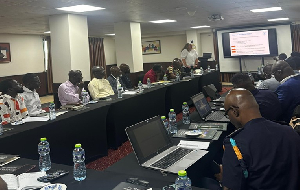 Some trainees at the event
Some trainees at the event
Members of the Council of the Freight Forwarder Association (CoFFA) are the latest to benefit from the European Union-World Customs Organization Rules of Origin Africa programme.
This initiative aims to support the African continent to improve its capacity to deal with rules of origin and ultimately to support the harmonized and well-coordinated implementation and application of the rules of origin under Annex 2 of the African Continental Free Trade Area (AfCFTA) and other regional and international commitments.
The programme, which had been restricted locally to customs officials since its inception, is the first one done specifically for customs brokers and freight forwarders who serve as intermediaries between government actors and traders.
The Assistant Commissioner in charge of Trade and Tariffs at the Customs Division of the Ghana Revenue Authority, Fechin Akoto, encouraged the private sector to immerse themselves in such training programmes to equip them for effective intra-continental trade.
“Let me mention that this is the basics and we have an advanced one it shouldn’t be the end. Every year we have an origin meeting at the Customs Head Office you can register and participate where you get to hear the problems from other parts of the world,” he added.
The President of the Customs Brokers Association, Ghana (CUBAG), Nana Fredua Agyeman Ofori-Atta, described the 3-day training in Accra as ground-breaking for his industry and hinted at more of such in the future.
Lead Origin Expert for the Program at the World Customs Organization, Mette Werdellin Azzam, who was the training facilitator, elaborated on the concept of rules of origin to Eye on Port.
“Rules of origin is what will determine the nationality of the goods. So in a free trade agreement, it will be mentioned what does it take for you, what do you have to do in your country for the goods to be originating? Do they come entirely from your country or do you use inputs from other countries and in that case what is the work you need to carry out here in your country for the goods to be originating?”
She emphasized the importance of properly roping in the private sector for the success of AfCFTA and other intra-continental trade agreements.
“I think that training on all levels is very important whether it is for Customs, for the intermediate business or for the business people themselves. We all need to understand the rules in order to take advantage of them and traders need to understand the rules so that they can make sure their goods are fulfilling the requirements when they want to export to other countries. You cannot count on brokers or whoever to know that for you,” he said.
